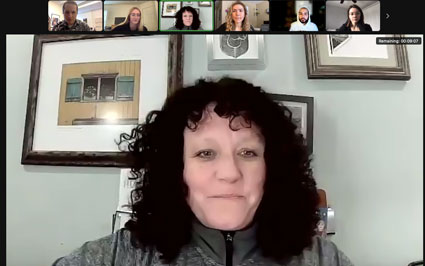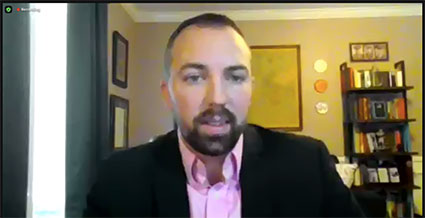OU’s Interprofessional Education Workshop spotlights mental health, substance use disorders
Oakland University recently held its 6th annual Interprofessional Education Workshop, which brought together 340 students, faculty and community leaders from various health professions, including nursing, physical therapy, medicine, physician assistant, public health and social work. This year’s workshop focused on mental illness and substance use disorders, complex conditions that often coexist and require interprofessional collaboration to manage properly.

OU social work instructor Megan Widman served as a faculty facilitator at this year's Interprofessional Education Conference.
According to the National Institute of Mental Health, research shows that about half of individuals who experience a substance use disorder will also experience a co-occurring mental disorder, and vice versa.
“These types of cases clearly demonstrate the need for interprofessional education,” said Deb Doherty, associate professor and chair of the Human Movement Science Department and the Interprofessional Education Task Force at OU. “Bringing together current and future health professionals of various roles and specialties to learn about, from and with each other helps build the connections that will translate into better health outcomes for patients and their families.”
This year’s event was keynoted by Dr. Jeffrey Guina, chief medical officer at Easterseals Michigan and a licensed physician who is board-certified in psychiatry, addiction medicine, forensic psychiatry and community psychiatry. Dr. Guina provided an overview of opioids, highly addictive substances that include Oxycodone (Oxycontin, Percocet), hydrocodone (Vicodin, Norco) Methadone, Fentanyl and Heroin. These drugs stimulate the “reward center” of the brain, overriding users’ ability to control behaviors that interfere with family, work, school and other responsibilities.
“Opioids are incredibly powerful. Anything that stimulates the reward center can cause dependence,” said Dr. Guina, who is also an adjunct associate professor at Oakland University William Beaumont School of Medicine and director of the psychiatry residency program at Beaumont Health.

Dr. Jeffrey Guina, chief medical officer at Easterseals Michigan, was the keynote speaker at this year's conference.
He added that individuals often engage in addictive behaviors – including substance use, binge eating and excessive screen time – in order to cope with underlying mental health issues and that the coronavirus pandemic has made matters worse.
“We know that pre-COVID about one out of five people were dealing with a mental health condition at any given time in the U.S. That has doubled during COVID,” said Dr. Guina. “We’ve seen skyrocketing rates of overdoses, suicides, calls to hotlines, EMS services and emergency rooms. It’s been a very stressful time for people who have a preexisting mental health condition, as well as those who didn’t have one before.”
There are various options for addressing substance use disorders, including withdrawal (going “cold turkey”), opioid replacement, symptomatic medications and psychosocial therapies. Dr. Guina called opioid replacement the “gold standard” for helping patients achieve long-term recovery and recommended a comprehensive treatment approach that integrates supportive services such as therapy, peer support, lifestyle intervention and coping skills training.
“Any one of these things alone is a piece of the puzzle, but only a piece of the puzzle,” he said. “It has to be done in combination to have the highest rate of success.”

Panel discussion participants, top row from left: Stephen Loftus, Kelsey Schell and Wendy Standifer; bottom row from left: Melodie Kondratek, Teresa Chahine and Rebecca Clemans.
Following the keynote address, students gathered in small interprofessional groups to discuss a case study of a patient dealing with mental health and substance use disorders. Each group was led by a faculty facilitator and a student facilitator who helped guide the discussion.
Later, the case study was discussed by a panel of health professionals who highlighted multi-disciplinary intervention options to optimize care while limiting the use of opioids. The panel was moderated by Stephen Loftus, Ph.D., OUWB associate professor of medical education and included five health professionals: Kelsey Schell, MPH, Wendy Standifer, MA, LPC, NCC, Melodie Kondratek, PT, DScPT, Rebecca Clemans, M.D. and Teresa Chahine, MSN, RN, PMHNP.

 February 21, 2022
February 21, 2022

